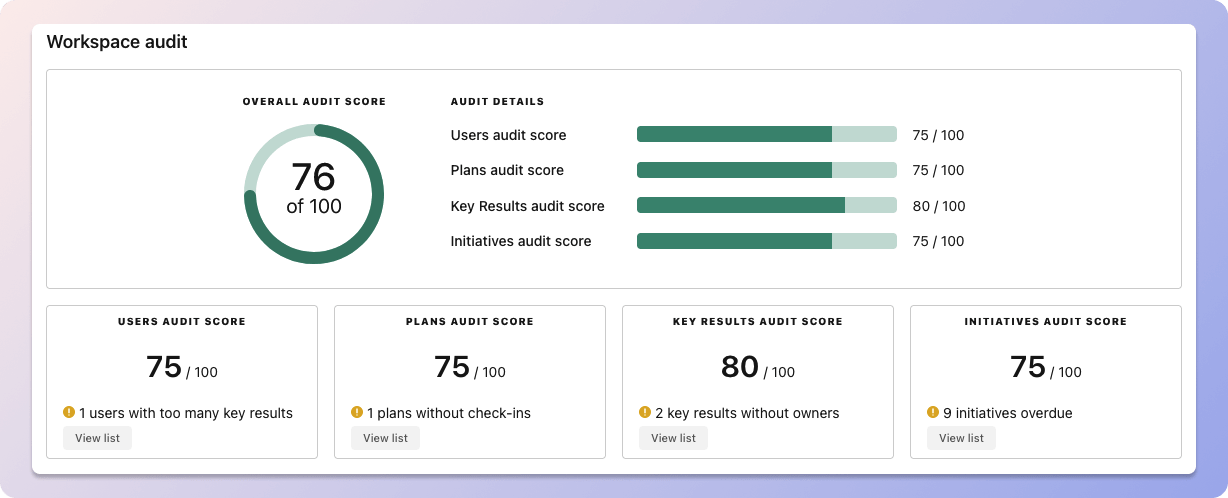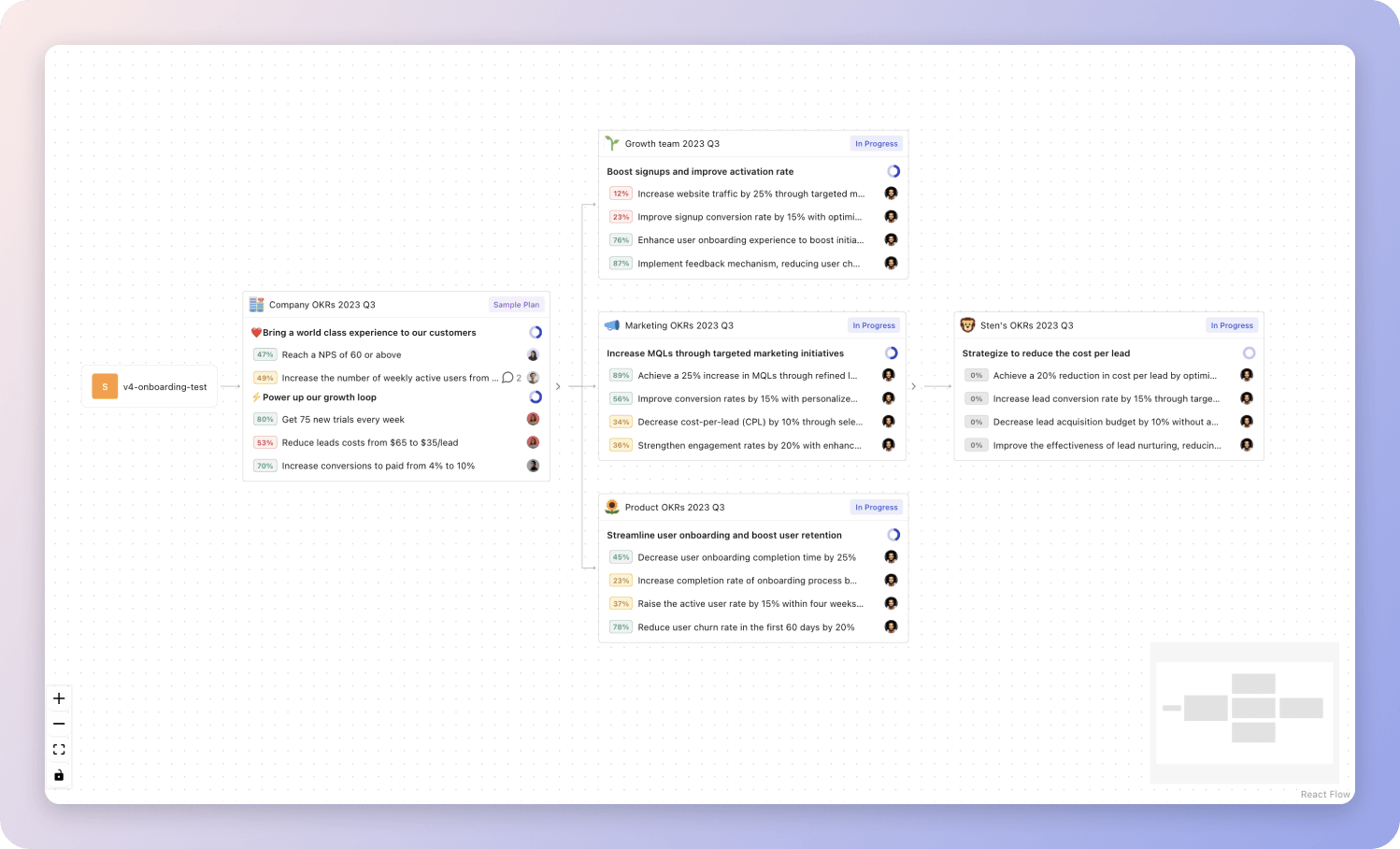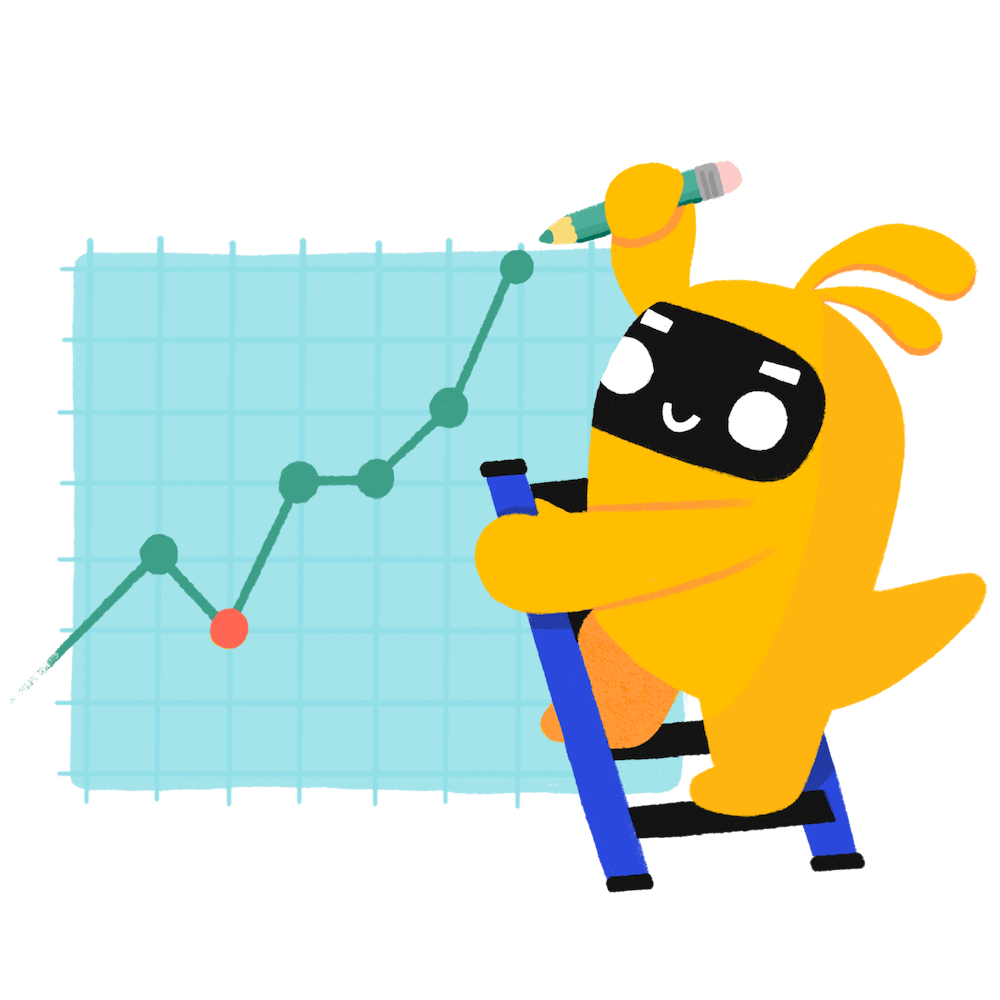15 customisable OKR examples for Human Resources
What are Human Resources OKRs?
The OKR acronym stands for Objectives and Key Results. It's a goal-setting framework that was introduced at Intel by Andy Grove in the 70s, and it became popular after John Doerr introduced it to Google in the 90s. OKRs helps teams has a shared language to set ambitious goals and track progress towards them.
Formulating strong OKRs can be a complex endeavor, particularly for first-timers. Prioritizing outcomes over projects is crucial when developing your plans.
We've tailored a list of OKRs examples for Human Resources to help you. You can look at any of the templates below to get some inspiration for your own goals.
If you want to learn more about the framework, you can read our OKR guide online.
Building your own Human Resources OKRs with AI
While we have some examples available, it's likely that you'll have specific scenarios that aren't covered here. You can use our free AI generator below or our more complete goal-setting system to generate your own OKRs.
Feel free to explore our tools:
- Use our free OKR generator
- Use Tability, a complete platform to set and track OKRs and initiatives, including a GPT-4 powered goal generator
Our customisable Human Resources OKRs examples
You will find in the next section many different Human Resources Objectives and Key Results. We've included strategic initiatives in our templates to give you a better idea of the different between the key results (how we measure progress), and the initiatives (what we do to achieve the results).
Hope you'll find this helpful!
1. OKRs to complete holistic roadmap for human capital management 2024
Complete holistic roadmap for human capital management 2024
Design 75% of HCM strategy encompassing recruitment, skills development, and retention
Outline tactics for employee retention
Develop a comprehensive recruitment plan
Design a strategy for skills development
Validate roadmap with 10+ HR experts and incorporate feedback for improvement
Identify and reach out to 10 HR experts for roadmap review
Gather and analyze feedback for potential improvements
Implement feedback into roadmap revisions
Identify all roadmap components and essential factors in the planning process
List all components required for the roadmap
Prioritize components based on their significance
Identify important elements for strategic planning
2. OKRs to promote and cultivate a diverse and inclusive workplace culture
Promote and cultivate a diverse and inclusive workplace culture
Increase the representation of underrepresented groups by 10% in all departments
Implement mandatory diversity and inclusion training for staff
Revise promotion policies to ensure equity
Develop recruitment strategies targeting underrepresented groups
Conduct and achieve a 90% participation rate in diversity and inclusion training
Develop a clear, compelling case for why diversity training is necessary
Set and communicate clear participation expectations to all employees
Promote the training through engaging communications
Improve inclusivity score by 15% as measured in quarterly employee engagement survey
Increase representation across all levels & departments
Implement regular diversity and inclusivity training workshops
Foster an open, transparent communication culture
3. OKRs to improve team performance through effective teamwork and collaboration
Improve team performance through effective teamwork and collaboration
Reduce conflicts within the team by 50% by implementing conflict resolution strategies
Encourage active listening and empathy among team members during conflicts
Establish a clear communication protocol to address conflicts promptly
Implement a mentorship program to provide guidance and support during conflict resolution
Conduct a team-wide conflict resolution training session
Develop team members' skills by organizing at least two team-building workshops focused on enhancing collaboration and problem-solving abilities
Increase team productivity by 20% through enhanced communication and coordination
Provide effective communication tools and train team members on how to use them
Implement regular team meetings to discuss progress, challenges, and goals
Encourage collaboration by assigning cross-functional projects and fostering teamwork
Develop a centralized system for task tracking, deadlines, and accountability
Enhance employee satisfaction and engagement by achieving an average team happiness score of 8 out of 10
Implement employee recognition programs to celebrate achievements and boost team morale
Analyze survey results to identify areas for improvement and develop targeted action plans
Provide regular opportunities for employee feedback and implement suggestions for enhancing happiness
Conduct quarterly employee satisfaction surveys to measure team happiness score
4. OKRs to enhance the effectiveness of people management practices
Enhance the effectiveness of people management practices
Increase team productivity by 20% through refined people management practices
Develop communication protocols to streamline information flow
Introduce peer recognition and reward systems
Implement weekly team-specific training and skill development sessions
Reduce turnover rate by 15% through improved management strategies
Implement comprehensive management training programs
Foster a positive and inclusive workplace environment
Develop clear communication channels between staff and management
Implement feedback collection system for 100% of team members
Train all team members on how to use the feedback system
Establish a regular schedule for feedback collection and review
Select an effective feedback collection tool suitable for the team
5. OKRs to scale and ensure long-term success of the new team
Scale and ensure long-term success of the new team
Improve team performance by implementing at least 2 training programs to enhance skills
Implement the selected training programs and track progress through regular evaluations and updates
Research and select two training programs that align with the identified skill gaps
Communicate the importance of the training programs and obtain buy-in from team members
Identify key skill gaps within the team through assessments and evaluations
Increase team size by hiring and onboarding 3 new members
Conduct effective interviews and assessments to select the most qualified candidates for the team
Advertise job openings through various channels to reach a wide pool of potential candidates
Update job descriptions and qualifications to attract suitable candidates for new team members
Implement a thorough onboarding process to ensure smooth integration and successful transition for new members
Establish a sustainable workflow that consistently meets team's productivity goals
Continuously analyze data and adjust workflow as needed to improve productivity and efficiency
Identify productivity goals and define clear metrics for measuring success
Streamline workflow processes to eliminate inefficiencies and reduce manual tasks
Implement regular team meetings to discuss progress, challenges, and brainstorm solutions
Achieve a 90% retention rate of existing team members through effective engagement efforts
6. OKRs to streamline the entire recruitment process for efficiency
Streamline the entire recruitment process for efficiency
Improve offer acceptance rate by 10%
Enhance job descriptions to appeal to more prospective candidates
Implement faster decision-making in the hiring process
Provide competitive salaries and benefits as incentives
Achieve a 15% increase in qualified candidate flow
Enhance employee referral program incentives
Develop robust, enticing social media recruitment strategies
Implement a more strategic job posting and advertising plan
Reduce average hiring cycle time by 20%
Regularly update and optimize hiring strategies
Use technology for efficient candidate screening
Implement streamlined application and interview procedures
7. OKRs to enhance the efficiency of internal team communication
Enhance the efficiency of internal team communication
Increase usage of team collaboration tools by 30%
Implement training sessions highlighting tool benefits and functionalities
Launch a company-wide communication promoting tool usage
Offer incentives for employees who regularly utilize the tools
Implement weekly team catch-up meetings, achieving 90% attendance
Track attendance to maintain rate above 90%
Schedule weekly meetings during common free time
Send reminders about meetings two days prior
Reduce email response time by 50%
Set dedicated times for checking and responding to emails
Prioritize emails based on urgency and importance
Use email templates for common responses
8. OKRs to develop a high-performing, cohesive team
Develop a high-performing, cohesive team
Boost team satisfaction score to above 80% through regular feedback and improvement
Implement weekly feedback sessions for open team communication
Provide training resources to improve skills
Establish a recognition system for excellent work
Increase team productivity by 20% through effective collaboration tools and training
Monitor and review team productivity post-implementation
Arrange training sessions on utilizing these tools effectively
Implement collaboration tools that streamline communication and teamwork
Achieve less than 5% turnover rate with better onboarding processes and work culture
Organize regular team-building activities
Initiate quarterly feedback and improvement sessions
Implement a comprehensive onboarding process for all new hires
9. OKRs to enhance feedback system for increased 360, recurring and upward feedback
Enhance feedback system for increased 360, recurring and upward feedback
Achieve 75% participation rate in upward feedback sessions every month
Develop engaging and accessible feedback sessions
Implement incentives for session participation
Regularly communicate the importance of participation
Increase the frequency of feedback session to twice a month
Train staff to give effective feedback
Establish clear feedback session guidelines
Schedule regular bi-monthly feedback sessions
Implement a monthly 360 feedback system for all team members by end of Q2
Train team members on feedback system usage
Develop a feedback schedule for all team members
Research and choose an appropriate 360-degree feedback tool
10. OKRs to assemble an outstanding professional team
Assemble an outstanding professional team
Identify and recruit 5 top performers from the industry within the deadline
Achieve a team satisfaction rate above 90% via effective team-building activities
Regularly assess team satisfaction through anonymous surveys
Facilitate open communication to address team concerns
Implement weekly team-building exercises to promote collaboration
Implement a new training program to improve team skills by 30%
Design a comprehensive, focused training program
Identify necessary skills for team productivity improvement
Schedule and conduct training sessions
11. OKRs to enhance compliance and precision in payroll management
Enhance compliance and precision in payroll management
Perform regular audits of payroll systems, ensuring 100% compliance with regulations
Regularly review and update audit procedures
Implement a compliance checklist for regulations
Establish frequent payroll system audit schedule
Conduct bi-weekly staff training sessions, improving payroll comprehension by 80%
Implement a feedback system to measure comprehension improvements
Schedule bi-weekly staff training sessions on payroll system
Develop clear, comprehensive payroll training materials
Implement a digital payroll system, reducing manual errors by 60%
Research top-rated digital payroll systems suitable for the company
Monitor, evaluate, and report system's performance and error rates
Initiate staff training for effective utilization of the new system
12. OKRs to streamline and optimize the payroll process
Streamline and optimize the payroll process
Increase payroll team's efficiency by providing training to enhance skills
Schedule and implement chosen training programs
Source relevant training programs for these skills
Identify skill gaps within the payroll team
Reduce payroll processing time by 20%
Implement a fully automated payroll system
Outsource payroll processing to a trusted company
Train staff on efficient payroll processing practices
Implement a new payroll software to reduce errors by 15%
Regularly monitor and evaluate software performance
Research and select an efficient payroll software
Train the HR team on the new software
13. OKRs to enhance engagement and commitment via effective communication
Enhance engagement and commitment via effective communication
Introduce bi-weekly inter-departmental meetings with 95% attendance
Design an engaging and relevant meeting agenda
Draft and distribute a meeting calendar to all departments
Implement a strict, yet incentivizing attendance policy
Achieve a 20% increase in positive feedback on internal communication through anonymous surveys
Enhance the anonymity of feedback surveys
Encourage prompt and constructive feedback
Implement weekly training for improving internal communication skills
Improve internal communication by launching a company-wide newsletter reaching 100% of staff
Determine relevant content for the company-wide newsletter
Design the newsletter layout and format
Set up a distribution system reaching all staff
14. OKRs to boost employee satisfaction post-adaptation
Boost employee satisfaction post-adaptation
Increase participation in adaptation-related activities by 70%
Create significant rewards for active engagement in adaptation-related activities
Develop motivational training programs for participants in these activities
Improve visibility of these activities through advertising and social media campaigns
Achieve 90% positive responses in post-change satisfaction surveys
Implement comprehensive training for new procedures
Survey employees before, during, after change
Provide clear communication surrounding change
Reduce workplace complaints related to adaptation by 40%
Create a robust employee feedback system
Enhance company-wide communication channels
Implement regular team-building exercises and workshops
15. OKRs to boost employees' understanding of corporate culture and core values
Boost employees' understanding of corporate culture and core values
Conduct three engaging workshops on firm's culture and values
Organize appropriate logistics and facilities for the workshops
Develop comprehensive, engaging content for each workshop
Choose relevant subjects pertaining to firm's culture and values
Implement a quarterly recognition program based on core values engagement
Develop criteria for recognising value engagement
Create a reward distribution plan for recognised employees
Identify and define company's core values clearly
Measure a 15% increase in correct answers on our cultural awareness quiz
Evaluate and compare new quiz results
Implement cultural awareness training sessions
Establish baseline data from current quiz results
Human Resources OKR best practices to boost success
Generally speaking, your objectives should be ambitious yet achievable, and your key results should be measurable and time-bound (using the SMART framework can be helpful). It is also recommended to list strategic initiatives under your key results, as it'll help you avoid the common mistake of listing projects in your KRs.
Here are a couple of best practices extracted from our OKR implementation guide 👇
Tip #1: Limit the number of key results
The #1 role of OKRs is to help you and your team focus on what really matters. Business-as-usual activities will still be happening, but you do not need to track your entire roadmap in the OKRs.
We recommend having 3-4 objectives, and 3-4 key results per objective. A platform like Tability can run audits on your data to help you identify the plans that have too many goals.
 Tability's audit dashboard will highlight opportunities to improve OKRs
Tability's audit dashboard will highlight opportunities to improve OKRsTip #2: Commit to weekly OKR check-ins
Don't fall into the set-and-forget trap. It is important to adopt a weekly check-in process to get the full value of your OKRs and make your strategy agile – otherwise this is nothing more than a reporting exercise.
Being able to see trends for your key results will also keep yourself honest.
 Tability's check-ins will save you hours and increase transparency
Tability's check-ins will save you hours and increase transparencyTip #3: No more than 2 yellow statuses in a row
Yes, this is another tip for goal-tracking instead of goal-setting (but you'll get plenty of OKR examples above). But, once you have your goals defined, it will be your ability to keep the right sense of urgency that will make the difference.
As a rule of thumb, it's best to avoid having more than 2 yellow/at risk statuses in a row.
Make a call on the 3rd update. You should be either back on track, or off track. This sounds harsh but it's the best way to signal risks early enough to fix things.
How to turn your Human Resources OKRs in a strategy map
OKRs without regular progress updates are just KPIs. You'll need to update progress on your OKRs every week to get the full benefits from the framework. Reviewing progress periodically has several advantages:
- It brings the goals back to the top of the mind
- It will highlight poorly set OKRs
- It will surface execution risks
- It improves transparency and accountability
Most teams should start with a spreadsheet if they're using OKRs for the first time. Then, once you get comfortable you can graduate to a proper OKRs-tracking tool.
 Tability's Strategy Map makes it easy to see all your org's OKRs
Tability's Strategy Map makes it easy to see all your org's OKRsIf you're not yet set on a tool, you can check out the 5 best OKR tracking templates guide to find the best way to monitor progress during the quarter.
More Human Resources OKR templates
We have more templates to help you draft your team goals and OKRs.
OKRs to boost our digital subscription numbers
OKRs to cultivate an autonomous, entrepreneurial culture with quick decision-making
OKRs to boost Iranian childhood cancer charity's brand recognition
OKRs to enhance overall employee engagement across the organization
OKRs to achieve regulatory compliance and manage change within budget
OKRs to strengthen network security through enhanced logging capabilities
OKRs resources
Here are a list of resources to help you adopt the Objectives and Key Results framework.
- To learn: What is the meaning of OKRs
- Blog posts: ODT Blog
- Success metrics: KPIs examples
Create more examples in our app
You can use Tability to create OKRs with AI – and keep yourself accountable 👀
Tability is a unique goal-tracking platform built to save hours at work and help teams stay on top of their goals.
 1 Create your workspace
1 Create your workspace 2 Build plans in seconds with AI
2 Build plans in seconds with AI 3Track your progress
3Track your progress